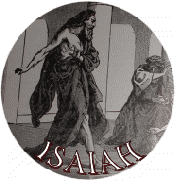|
|
Introduction to Isaiah 28-33These six chapters are naturally divided into five or six sections depending on whether chapter 29:15 is a subsection of chapter 29 or forms an independent section. Each section is clearly marked with the initial word “woe”. They do not appear to be a collection of odd prophecies but rather a series. They expose Judah’s wickedness. Judah is portrayed with all her evils including trusting Egypt for protection. The setting is different to chapters 7-11 where Ahaz, an evil king, encourages all sorts of evil behavior. In those chapters, God brings to light some beautiful promises to the faithful remnant. Comfort was brought. Now, however, with King Hezekiah encouraging acts of reform, the Lord has very few comforting words. Judgment of the still residing evils is the predominant message in these chapters (28-33). God certainly is demanding real trust and holiness and not just a superficial facelift. Positively speaking, God was urging Israel to conform to her calling of a true theocracy. This would affect Israel in two major ways:
Simply put, they would trust and believe in God. However, they refused to do this. |
Chapter 28Isaiah begins by first showing the northern kingdom of Israel that their pride and scoffing would bring them to destruction. Not many years had passed before God used Assyria in judging the northern kingdom known as Ephraim, the capital of Israel. It is this very same judgment which occurred north of Judah’s border during Hezekiah’s reign that served as a background for chapters 29-32. The prophet warned Israel in the north of their evils and due punishment. Judah now is being forewarned and her judgment or reward is awaiting Judah’s response. |
Chapter 29In this chapter we begin to see the lack of trust toward God in their supposed theocracy.Hezekiah buckled under pressure from others to depend on this supposed help of Egypt. God exposed their intended secret sessions discussing their foreign policy. This great city of David (Ariel), which was holding feasts to celebrate God’s commands, was spiritually blind. They were insensitive and unwilling to get behind the traditions and sincerely trust God and His promises. They did not want to discover the real meanings behind the traditions and so initiate change. Insensitivity toward God brings moral decay. |
Chapter 30From their not so secret counsels they have developed decisions which ignored the Lord’s desires.The prophet has made it perfectly clear how foolish these decisions not to trust God were. He also clearly declared the way of salvation before them.
The struggle continued however. The rebellious children lived according to their foolish plans. However, warnings of judgment on account of the outbreak of their iniquity were getting very common. The judgments took shape in the forms of discipline leading to obedience. |
Chapter 31-32Planning often reveals one’s motives and intentions.The actual carrying out of their plans confirms a lack of repentance. Judah actually goes down to Egypt to confirm their disloyalty to God. They trust in what one sees rather than in the promises of the invisible God. Their ‘deep defection’ is sadly but clearly portrayed. But even with their ‘deep defection,’ a real repentance even among the women can bring about the realization of wonderful hopes. |
Chapter 33This section (28-33) began with the topic of Israel (Ephraim) and so it ends appropriately with the topic of Assyria, Ephraim’s judge.God is bringing an exciting hope to God’s people. Their great menace is surely going to be put aside. Assyria not only became a tool for God to judge the northern kingdom, He was also going to use them to warn the southern kingdom of Judah of the consequences of sin. Isaiah further encourages Judah to respond by portraying the ideal future kingdom life. Hopefully, they would no longer consider their personal sin as a trifle matter but a serious one demanding repentance. |
Summary and ApplicationGod uses everything feasible to bring His people to be completely faithful to Himself. This was to be expected because they are God’s covenant people. However, they were not to presume upon God’s grace. A great warning of persistent sin is clearly seen from Assyria’s destruction of Israel in the north (ch. 28). God is dead serious. Judah, although recently has had many good reforms by Hezekiah, is still lacking. Complete obedience is always what God wants. So He shows them their foolish ways by their
They clearly depict the gradual steps away from a true love towards God. God calls them ‘blind,’ and ‘rebellious.’ Partial moral reforms are not good. God desires to penetrate into every segment of our culture. They made the Egyptians their idol. Threats of judgment, promises of hope and even predictions and assurances of their arch enemy are all various means God uses to instigate true reform. God desires for His people to live holy and so to represent before the nations the greatness of this God. We often do not think that our wealth, government and jobs form a part of our trust. we have insurance. We really do not know who we trust. How do you trust? Have you been tested? How sure are you that you trust God? Try asking God to help you see any idols in your life. It is better for them to be exposed now rather than in judgment. |
| Book of Isaiah: Plan and Outline Overview of the Book of Isaiah
Background of the Book of Isaiah A Historical Timeline of Isaiah
Section Introduction & Background |
Isaiah Expository Studies: The Bible Teaching Commentary Isaiah 6:1-12 Righteous Living |
BFF Homepage | Top | Back | Isaiah Overview | Next
